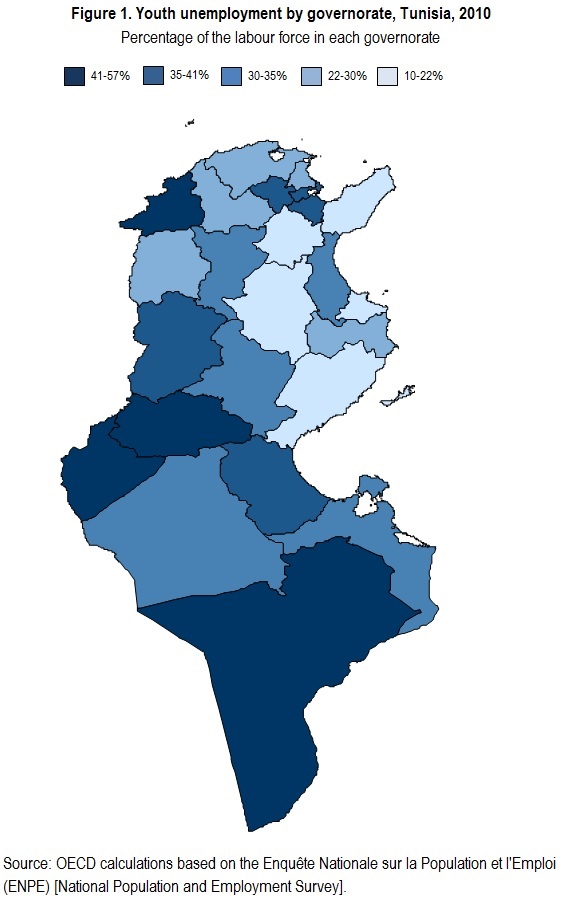Youth unemployment in Tunisia: The need to invest in and activate skills is greater than ever

By Stijn Broecke.
In recent weeks, Tunisia has hit the headlines again – unfortunately not for the right reasons. Protests sprung up all around the country and a nationwide curfew was imposed in events reminiscent of those leading up to the beginning of the “Arab Spring” just over five years ago.
Sadly, one of the key reasons behind these protests was the same as those that sparked unrest in December 2010: high youth unemployment – except the problem is now even worse. While up-to-date statistics on youth unemployment are not readily available, the overall unemployment rate in the third quarter of 2015 was 15.3%, compared to 13.0% in 2010. The youth unemployment rate is likely to be at least twice as high (it was 37.6% in 2012) – and it hides important swathes of the youth population (especially women) who have simply dropped out of the labour force. In addition, the problem is far worse in some regions than in others (Figure 1).
The individual suffering that this brings is immense – particularly in a country where, as the OECD report Investing in Youth: Tunisia argued just a year ago, a large proportion of youth is left without any social protection. A large divide between the haves and have nots also risks destroying social cohesion, and fuelling extremism which is already posing an important security threat to the country. But youth unemployment, which is particularly high among the most educated in Tunisia, also brings enormous economic costs as vast amounts of human capital simply go wasted.
In fact, activating this human capital, the skills of Tunisian youth, should be one of the top policy priorities for the country’s decision makers. But first, the right skills are needed. Tunisia has done well in terms of expanding access to education and significant progress has been made in enrolment and completion rates, particularly at higher levels of education. However, the quality and relevance of this education can sometimes be called into question and, as the as the OECD pointed out in its report Investing in Youth, the school-to-work transition of young Tunisians can be significantly improved by investing in an effective vocational education and training (VET) system which is both attractive to students as well as demand-driven.
The OECD report goes on to argue that actions are also needed on the side of employment and social policy that will bear immediate fruits, such as providing adequate income support, effective employment services and other active labour market measures. These immediate interventions, in turn, must be buttressed by action which will address structural labour market and social barriers to youth entering productive and rewarding jobs, including policies and institutions that affect the cost of hiring and the ability of employers to adjust flexibly to changing economic circumstances. Attention should also be focused on the most disadvantaged groups of youth, such as the low-skilled, who face the greatest risk of becoming permanently marginalised from the labour market and society.
The Nobel Prize for peace was awarded to Tunisia in 2015 for its ability to lead a national dialogue that kept the country on track towards building a pluralistic democracy – despite political assassinations and widespread social unrest which risked destabilising this process. It is now high time to show the same unity and political courage to address an issue which will determine the future of the country for generations to come and make a real difference to the lives of Tunisia’s youth today.
Our team at Inergency is excited to announce our partnership with @Disasters Expo Europe, the leading event in disaster management.
Join us on the 15th &16th of May at the Messe Frankfurt to explore the latest solutions shaping disaster preparation, response and recovery.
To all our members, followers, and subscribers in the industry, This is YOUR opportunity to explore the intersection of sustainability and disaster management, connect with industry leaders, and stay at the forefront of emergency preparedness.
Don't miss out! Secure your complimentary tickets now and be part of the conversation driving innovation in disaster resilience. ➡️ https://lnkd.in/dNuzyQEh
And in case you missed it, here is our ultimate road trip playlist is the perfect mix of podcasts, and hidden gems that will keep you energized for the entire journey



